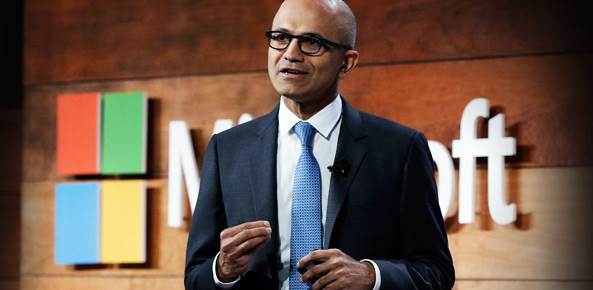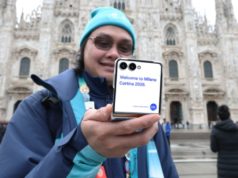
In a heated competition for business’ technology dollars: Microsoft is doubling down on a simple pitch: its products are safe, and smart.
The Redmond company on Monday [kicked] off its annual Ignite conference for corporate information technology workers by introducing new security features into Office and Windows designed to safeguard and better make use of corporate data.
The conference typically attracts tens of thousands of IT buyers to see a parade of Microsoft executives and product demos. On Monday, that means speeches by Chief Executive Satya Nadella [pictured here] and Cloud and Enterprise engineering chief Scott Guthrie, among other events.
Security is a high profile issue for the audience here, a crowd eager to avoid the high-profile security breaches that plundered customer data from the likes of Target, the Home Depot, and, most recently, Yahoo.
Judson Althoff, Microsoft’s new corporate sales chief, struck that tone in a briefing for journalists and technology analysts Sunday night.
“We’re building security deeply into every product family that we have,” Althoff said.
A slate of product features [introduced] on Monday are designed to protect a company’s internet users from themselves. Firewalls and application security protocols can be rendered moot if a user clicks on a malicious link in an email or ventures outside the corporate sandbox with unapproved software.
One tool, called Windows Defender Application Guard and set for release to business editions of the Windows 10 operating system next year, walls off the Microsoft Edge browser from a computer’s other software and corporate network, keeping malware accessed on the web from spreading beyond the Web browser.
A similar feature of the web-based Office 365 productivity suite will show users a placeholder version of an email attachment while the software scans it for viruses and known malicious links.
Separate tools are designed to help IT workers identify and respond to security threats to Windows and Office.
Among other announcements:
–Windows Server 2016, the latest edition of Microsoft’s server software operating system, and the System Center 2016 management tool will both be formally released in October.
–Microsoft is touting a deal with Uber to provide the ride-hailing company with web-based facial recognition tools to verify its drivers’ identity when they log into the application. Uber says the feature is designed to keep riders safer and guarantee drivers’ that their accounts aren’t being misused.
–The Renault-Nissan global sales partnership has signed a multi-year deal to use Microsoft’s Azure cloud-computing platform to power portions of its navigation, predictive services and remote monitoring features for drivers.
–Microsoft is continuing to advertise its willingness to play well with others. Julie White, a corporate vice president in Microsoft’s Cloud and Enterprise group, says the company has probably written more software for Google’s Android and Apple’s iOS mobile platform than any other firm.
“That same strategy applies to our cloud platform as well,” she said, referring to the on-demand computing power and software Microsoft is increasingly trying to sell.
© 2016 Seattle Times under contract with NewsEdge. -.







